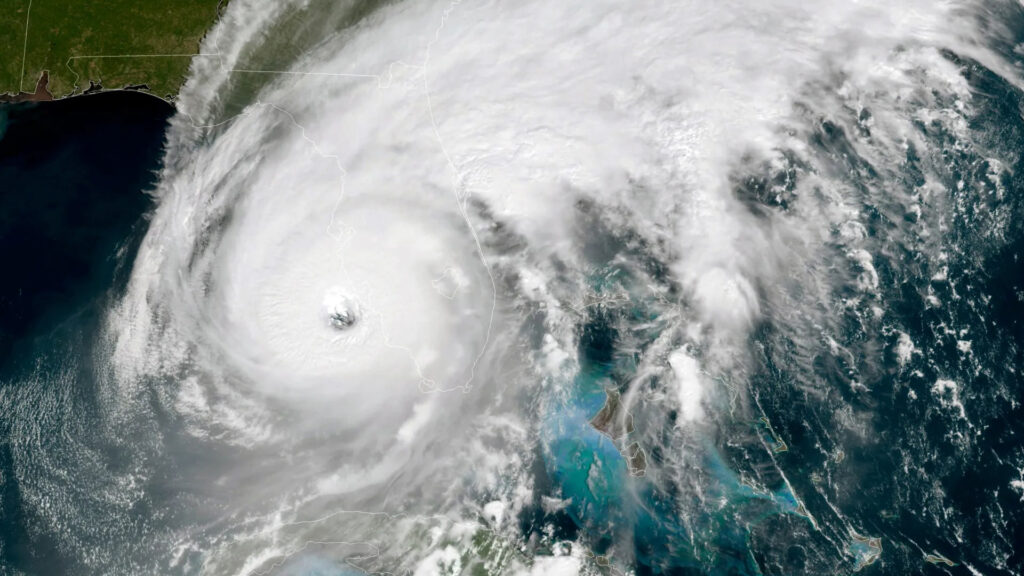By Mitchell Etheridge
Disaster capitalism has overtaken climate resilience, turning the wreckage of places like Southwest Florida into lucrative opportunities for institutionalized wealth.
Hurricane Ian caused an estimated $113 billion in direct damages; hurricanes Helene and Milton likely added another $200 billion. Post-storm restoration revenue is innumerable.
Recovery is more profitable than resilience. Industry thrives off Floridian denial; we reject nature’s reclamation and pay to rebuild our sandcastles at high tide. We have nowhere else to go; we must roll the dice each year, praying to be spared at the expense of another.
Hurricane Ian took nearly everything from my family. We were displaced and destitute and the industrial machine of bureaucratic gluttony remained indifferent.

We spent hundreds of hours fighting for fair compensation, yet our insurance provider made it nearly impossible to receive a justified payout. City, county, state and federal agencies proved to be even more subversive than the insurers — their regulations were contradictory and their efforts clashed. After two and half years of battle and two more hurricanes, we remain eternally navigating contractor, code compliance and insurance disputes.
My family’s experience is not unique; hundreds of thousands of Floridians cannot avoid Mother Nature’s intensifying wrath. The endless cycle of recovery and destruction has left individuals financially and psychologically depleted. Construction and infrastructure projects are now annually thwarted and the environment has no time to restore natural resilience.
Our future is bleak; extensive reform is imperative. We must mobilize beyond partisan lines, forging coalitions of pragmatic populists committed to breaking the establishment’s stranglehold. We must demand governance that is both lean and effective, where bureaucratic bloat is slashed and social safety nets are expanded.
Policy must realign capital incentives — industry should be driven to strengthen communities, not exploit them. Resilience must take precedence over recovery and the costs of catastrophe must not fall solely on the public nor the environment.
Disaster capitalism must be replaced by human-centered capitalism. Insurance companies and corporate developers must be held accountable and sustainable restoration must be prioritized. Building codes must enforce storm-resistant, climate-adaptive designs and rebuilding in repeatedly devastated zones must be sensibly restricted.
Coastal overdevelopment must end. Natural storm barriers must be rehabilitated and expanded. Mangroves, wetlands and oyster reefs must be treated as public utilities. Infrastructure must be fortified: drainage systems upgraded, roads elevated, utilities flood-proofed.
Corporations must be held accountable for pollution, industrial runoff and the long-term environmental destruction they leave behind. Disaster recovery must be overhauled — insurance cannot remain a predatory industry that abandons homeowners when they need it most.
Those displaced by climate catastrophe must receive meaningful relief. Government action must prevent their displacement from becoming permanent instability. Direct financial assistance, including relocation grants and tax credits, must be given to the displaced and destitute, along with federal climate refugee status and legal protections.
Community resettlement grants must be distributed to sanctuary regions, equipping municipalities with the resources necessary to absorb climate migrants without overwhelming local infrastructure. Comprehensive housing initiatives must focus on expanding supply, stabilizing prices and preventing the exploitation of displaced communities.

The unprecedented nature of this crisis demands bold, unconventional action. Whether it is reviving the Civilian Conservation Corps to spearhead climate response and restoration, implementing a Universal Basic Income to increase economic mobility and resilience, or establishing publicly funded disaster relief pools with a federally backed single-payer home insurance program to guarantee fair payouts, constructive social programs and safety nets are essential solutions to emerging challenges.
Regardless of national discourse, Floridians from both conservative and liberal persuasions collectively acknowledge our fate. We are not radicals; we believe humanity contributes to climate change, while also recognizing that natural fluctuations impact weather patterns.
We support the green movement while acknowledging its limitations and pitfalls, and advocate for pragmatic and equitable solutions to the undeniable climate crisis. We are not anti-industry; we believe capital incentives should align with public wellbeing.
We have watched the tide creep higher each summer, and as sea walls crumble and Southwest Florida sinks, we seek refuge from the unrelenting waves of chaos and winds of greed.
Mitchell Etheridge is a third-generation Floridian who was born and raised in Lee County. This piece was adapted from a longer essay on his Substack, “Waves of Chaos & Winds of Greed.” Banner photo: A home destroyed by Hurricane Ian in Lee County (iStock image).
Sign up for The Invading Sea newsletter by visiting here. To support The Invading Sea, click here to make a donation. If you are interested in submitting an opinion piece to The Invading Sea, email Editor Nathan Crabbe at nc*****@*au.edu.



